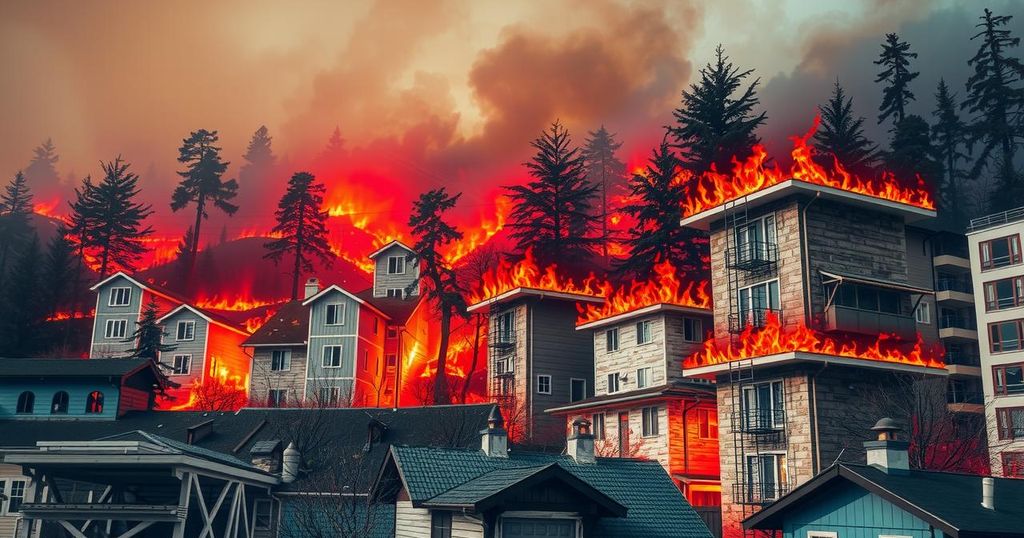Intersec 2025 Conference to Address Rising Fire Risks from Climate Change in the Middle East
Climate change is intensifying fire risks in the Middle East, requiring innovative solutions. The Intersec 2025 Fire & Rescue Conference will focus on these challenges, with discussions on the impacts of rising temperatures and water scarcity on firefighting operations. Experts emphasize the need for advanced technologies and proactive strategies to enhance fire safety in the region.
Climate change is exacerbating fire risks across the Middle East, heightening the need for technological innovations in firefighting practices. During the upcoming Fire & Rescue Conference at Intersec 2025, from January 14-16 at the Dubai World Trade Centre, industry experts will gather to discuss these pressing challenges. Experts indicate that increasing temperatures, along with prolonged droughts, are stressing firefighting operations throughout the region, intensifying the threat of wildfires even in arid environments.
The Middle East is already grappling with significant impacts from climate change, with predictions indicating a surge in extreme heat days. By 2050, the UAE may experience up to 144 extreme heat days annually, while Saudi Arabia may encounter 124 days. Coupled with water shortages, these developments necessitate immediate adaptations in fire response strategies, particularly in expanding urban areas. Dana Nassif, Senior Consultant – Fire & Life Safety at WSP Middle East, noted, “Rising temperatures and droughts are increasing fire risks across the Middle East.” Nassif emphasized the importance of sustainable water management and advanced fire technologies that integrate artificial intelligence (AI) and predictive modeling.
Research underscores the severity of water scarcity issues in the UAE and Saudi Arabia, where droughts are projected to occur every five years on average. Paul Jennings, Assistant Fire Commissioner at Red Sea Global, remarked on the emphasis on public safety, stating, “At Red Sea Global, ensuring the safety and well-being of our guests is our top priority.” This commitment involves a dedicated team trained in emergency response protocols and continuous investments in advanced safety technologies.
In response to these challenges, both nations are taking significant steps to bolster their water management and firefighting capabilities, including Saudi Arabia’s investment in $6 billion towards water projects and initiatives like the UAE’s Water Security Strategy 2036.
Intersec 2025 will feature critical discussions on fire safety advancements, particularly in the utilization of AI technologies for fire prevention. The event will host numerous distinguished exhibitors who will present innovative solutions tailored to evolving fire safety needs. Grant Tuchten, Portfolio Director at Messe Frankfurt Middle East, stated, “Intersec 2025 will provide a platform for fire safety experts… to address the growing fire risks in the Middle East.”
The 26th edition of the Intersec event underscores the collaboration required among various sectors to enhance safety and resilience across the region.
Climate change poses a significant threat to the Middle East, especially regarding fire risks due to rising temperatures, extended droughts, and changing weather patterns. These factors stress current firefighting infrastructures and strategies, drawing attention to the need for advanced technologies and sustained efforts to address the unique challenges the region faces. The forthcoming Intersec 2025 will highlight these issues, bringing together experts to explore innovative solutions for enhancing fire safety amid escalating climatic challenges.
In summary, the increasing fire risks linked to climate change necessitate urgent adaptations in firefighting strategies in the Middle East. The Intersec 2025 conference represents a critical platform for discourse on technological advancements and sustainable practices essential for future fire safety. Proactive measures by regional governments, alongside contributions from industry leaders, will be paramount in addressing the growing challenges posed by climate-related fire incidents.
Original Source: premierconstructionnews.com




Post Comment